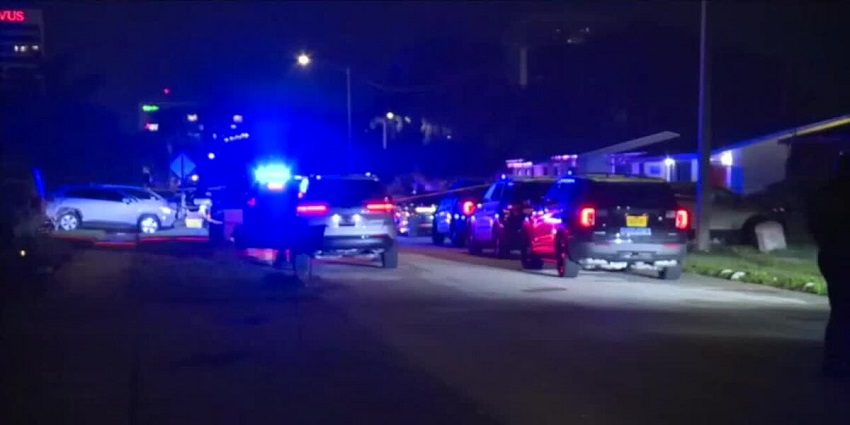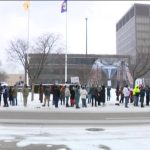GRAND RAPIDS, Mich. — The recent death of 61-year-old Aleta Lung in her Grand Rapids apartment has cast a spotlight on the ongoing epidemic of domestic violence that continues to affect lives in West Michigan and across the nation. Police suspect that Lung was murdered by her boyfriend, 47-year-old Randy Buckner, whose arrest in New Mexico has brought attention to the destructive cycle of abuse.
Lung’s daughters, La’Janette and Loretta Russell, recall the complex and often hidden dynamics of their mother’s relationship. Though they feared something was wrong, they could not identify the full extent of the abuse. According to La’Janette, their mother often spoke of troubling statements made by Buckner. “That’s not something someone would say who truly cared about you,” she remarked. Lung’s behavior further reflected signs of emotional abuse. Her daughters remember her expressing relief after breaking up with Buckner, only for them to reconcile soon after in secrecy.
Police discovered Lung’s body last Wednesday after they believed she had been dead for two or three days. Investigators later tracked Buckner driving Lung’s car across state lines and arrested him. As police dug into his history, they found that Buckner had previously been involved in a domestic violence incident at Lung’s home, during which she expressed concerns for her safety.
The tragic story is a familiar one to advocates like Priscilla Bordayo, a Michigan-based sexual assault survivor turned advocate. She explained that many victims of abuse experience a gradual escalation, starting with mental manipulation that turns into verbal and physical abuse. “You hear and see a lot of things start off with mental abuse. It becomes verbal and then it turns into physical,” Bordayo said, stressing the importance of early intervention.
Rachel VerWys, CEO of the nonprofit Safe Haven Ministries in Grand Rapids, echoed these sentiments, stating that the circumstances surrounding Lung’s death are all too common. “The death of someone makes us wrestle with the stark reality that this is happening every day in our community in terms of abuse,” VerWys said.
Bordayo added that abusers often isolate their victims from friends and family, making it difficult for outsiders to detect the signs of abuse. “They feel like this is love,” she said. “They feel like they’re trapped, they feel like they don’t have the resources or have a place to go and get the help they need.”
Domestic violence often remains hidden, leaving loved ones unaware of the extent of the harm until it is too late. Advocates urge family and friends to be proactive if they suspect something is wrong. Bordayo recommends that loved ones reach out, offering themselves as a safe space for victims to express their concerns. “Let them know you’re a safe place,” she advised. “That you believe them. That you’re there for them.”
In addition to providing emotional support, Bordayo stressed that resources are available for domestic violence victims. These services can assist with everything from medical bills and lost wages to counseling and rehabilitation. She urged survivors to take advantage of victim compensation programs to help them rebuild their lives after experiencing abuse.
As the community grapples with the loss of Aleta Lung, advocates continue their work to raise awareness and ensure that survivors have the support they need to escape abusive relationships. The message is clear: domestic violence must be recognized early, addressed with compassion, and met with the full support of communities committed to preventing future tragedies.








Outstanding transition cleaning, got our deposit back completely. This should be standard moving. Transition heroes.
You got a very fantastic website, Glad I detected it through yahoo.
I like what you guys are up too. Such intelligent work and reporting! Keep up the excellent works guys I have incorporated you guys to my blogroll. I think it will improve the value of my web site :).
I discovered your blog website on google and check just a few of your early posts. Continue to keep up the very good operate. I just extra up your RSS feed to my MSN News Reader. In search of ahead to studying more from you in a while!…
you are actually a just right webmaster. The website loading speed is amazing. It sort of feels that you’re doing any unique trick. In addition, The contents are masterwork. you have performed a wonderful task on this matter!
hello there and thank you for your information – I have definitely picked up anything new from right here. I did however expertise some technical points using this website, as I experienced to reload the site lots of times previous to I could get it to load correctly. I had been wondering if your web host is OK? Not that I’m complaining, but sluggish loading instances times will often affect your placement in google and can damage your quality score if advertising and marketing with Adwords. Well I’m adding this RSS to my e-mail and can look out for a lot more of your respective interesting content. Ensure that you update this again very soon..
I always was interested in this topic and still am, regards for putting up.
Hi, I desire to subscribe for this weblog to take latest updates, thus where can i do it please help.
Brasilia independent escorts
I would like to thank you for the efforts you’ve put in writing this blog. I am hoping the same high-grade website post from you in the upcoming also. Actually your creative writing skills has inspired me to get my own site now. Really the blogging is spreading its wings rapidly. Your write up is a good example of it.
Just wanna comment on few general things, The website layout is perfect, the written content is very excellent. “In business school classrooms they construct wonderful models of a nonworld.” by Peter Drucker.
Very good written information. It will be useful to anybody who usess it, including myself. Keep doing what you are doing – for sure i will check out more posts.
I gotta favorite this web site it seems very helpful invaluable
WOW just what I was looking for. Came here by searching for %keyword%
https://sot.technopol.bg/2025/12/24/atlas-tv-decouvrez-le-guide-complet-de-liptv-en-2025/
I wanted to put you the bit of remark to finally thank you very much as before on your spectacular methods you have documented on this website. This has been really generous with people like you to present easily just what many of us would’ve advertised for an ebook to end up making some profit for their own end, most notably considering that you might have done it in case you considered necessary. Those advice additionally worked to become great way to be certain that other individuals have similar eagerness really like my personal own to see very much more with respect to this condition. I’m certain there are millions of more pleasurable sessions up front for folks who take a look at your website.
I am now not certain where you are getting your info, however great topic. I must spend some time finding out much more or working out more. Thanks for excellent information I was in search of this info for my mission.
Hi! I know this is somewhat off topic but I was wondering if you knew where I could find a captcha plugin for my comment form? I’m using the same blog platform as yours and I’m having trouble finding one? Thanks a lot!
Magnificent web site. Lots of useful info here. I’m sending it to several friends ans also sharing in delicious. And of course, thanks for your effort!
hi!,I like your writing very so much! percentage we keep in touch extra approximately your post on AOL? I need a specialist on this house to unravel my problem. Maybe that is you! Having a look ahead to peer you.
That is very interesting, You’re a very skilled blogger. I have joined your rss feed and sit up for seeking more of your wonderful post. Also, I’ve shared your website in my social networks
рейтинг онлайн казино с приложениями на реальные деньги рубли
https://t.me/s/kAZiNo_S_MINImAlnYm_dePoziTOM/10
https://1wins34-tos.top
https://t.me/s/minimalnii_deposit/74
https://t.me/s/KAZINO_S_MINIMALNYM_DEPOZITOM
Hey there! I’m at work surfing around your blog from my new iphone 3gs! Just wanted to say I love reading through your blog and look forward to all your posts! Keep up the superb work!
https://igruli.com.ua/5-pomylok-pry-vybori-bi-led-linz-yaki.html
It’s remarkable to pay a quick visit this website and reading the views of all colleagues about this post, while I am also zealous of getting experience.
igrice kokoske
My Profile – This post is worth everyone’s attention. Where can I find out more?
Click Here – I’m bookmarking this for future reference. Great info!
Somebody essentially lend a hand to make significantly posts I might state. This is the first time I frequented your website page and to this point? I surprised with the research you made to create this particular submit extraordinary. Great task!
https://t.me/s/russiA_casino_1wIN
Hiya, I am really glad I’ve found this information. Nowadays bloggers publish only about gossips and net and this is actually frustrating. A good website with interesting content, that’s what I need. Thank you for keeping this website, I will be visiting it. Do you do newsletters? Can not find it.
Valuable info. Lucky me I found your site by accident, and I’m shocked why this accident did not happened earlier! I bookmarked it.
**mounja boost**
MounjaBoost is a next-generation, plant-based supplement created to support metabolic activity, encourage natural fat utilization, and elevate daily energywithout extreme dieting or exhausting workout routines.
**boostaro reviews**
Boostaro is a purpose-built wellness formula created for men who want to strengthen vitality, confidence, and everyday performance.
Wow that was unusual. I just wrote an extremely long comment but after I clicked submit my comment didn’t show up. Grrrr… well I’m not writing all that over again. Regardless, just wanted to say wonderful blog!
My Profile – This is gold. Thank you so much!
Good info. Lucky me I reach on your website by accident, I bookmarked it.